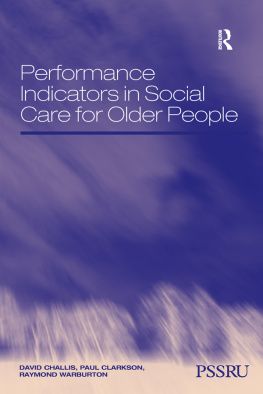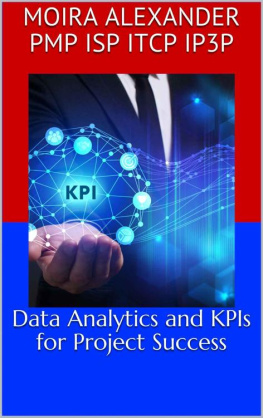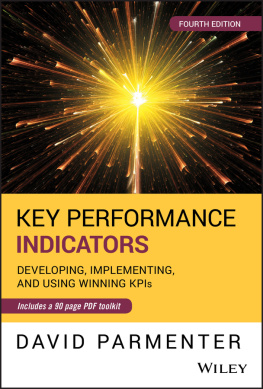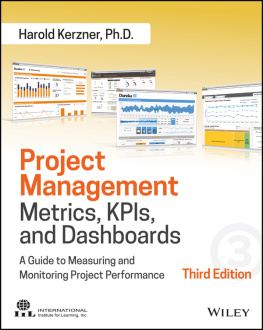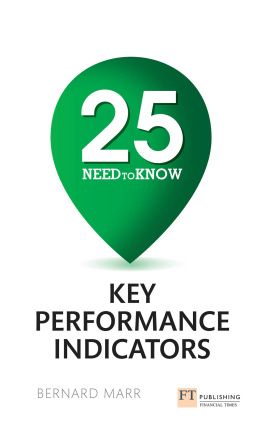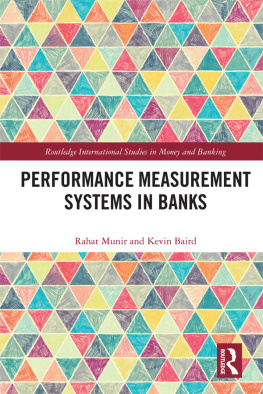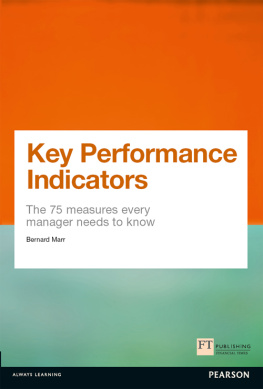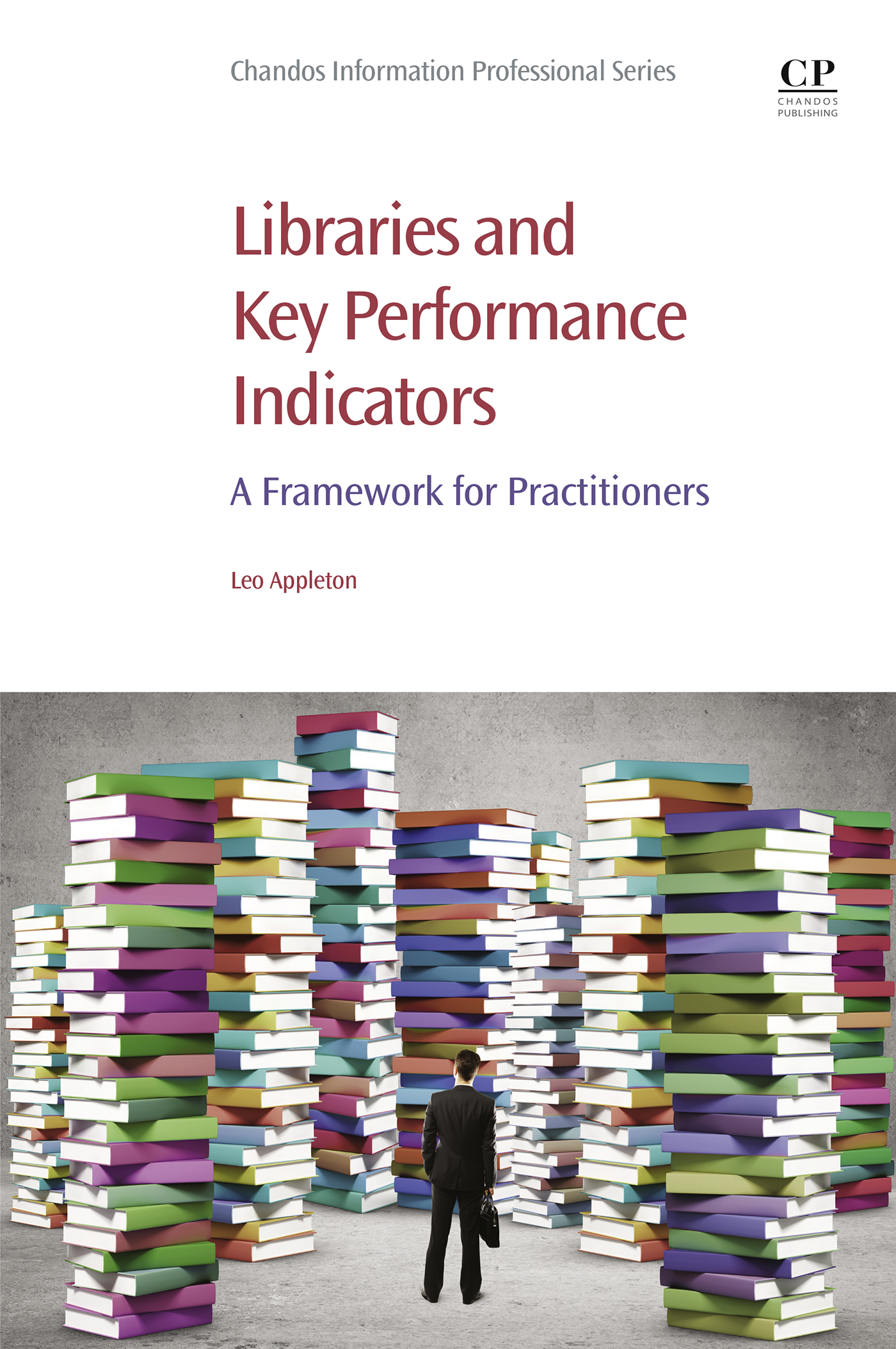Libraries and Key Performance Indicators
A Framework for Practitioners
First Edition
Leo Appleton

Copyright
Chandos Publishing is an imprint of Elsevier
50 Hampshire Street, 5th Floor, Cambridge, MA 02139, United States
The Boulevard, Langford Lane, Kidlington, OX5 1GB, United Kingdom
Copyright 2017 Leo Appleton. Published by Elsevier Ltd. All rights reserved.
Appendix A is accredited to Kingston University.
Appendix B,C,D are accredited to NHS.
Appendix E is accredited to British Library.
Appendix F is accredited to Edge Hill University, Learning services.
Appendix G is accredited to McMaster University.
No part of this publication may be reproduced or transmitted in any form or by any means, electronic or mechanical, including photocopying, recording, or any information storage and retrieval system, without permission in writing from the publisher. Details on how to seek permission, further information about the Publishers permissions policies and our arrangements with organizations such as the Copyright Clearance Center and the Copyright Licensing Agency, can be found at our website: www.elsevier.com/permissions.
This book and the individual contributions contained in it are protected under copyright by the Publisher (other than as may be noted herein).
Notices
Knowledge and best practice in this field are constantly changing. As new research and experience broaden our understanding, changes in research methods, professional practices, or medical treatment may become necessary.
Practitioners and researchers must always rely on their own experience and knowledge in evaluating and using any information, methods, compounds, or experiments described herein. In using such information or methods they should be mindful of their own safety and the safety of others, including parties for whom they have a professional responsibility.
To the fullest extent of the law, neither the Publisher nor the authors, contributors, or editors, assume any liability for any injury and/or damage to persons or property as a matter of products liability, negligence or otherwise, or from any use or operation of any methods, products, instructions, or ideas contained in the material herein.
Library of Congress Cataloging-in-Publication Data
A catalog record for this book is available from the Library of Congress
British Library Cataloguing-in-Publication Data
A catalogue record for this book is available from the British Library
ISBN: 978-0-08-100227-8 (print)
ISBN: 978-0-08-100255-1 (online)
For information on all Chandos publications visit our website at https://www.elsevier.com/books-and-journals

Publisher: Glyn Jones
Acquisition Editor: George Knott
Editorial Project Manager: Anna Valutkevich
Production Project Manager: Debasish Ghosh
Cover Designer: Greg Harris
Typeset by SPi Global, India
About the Author
Leo Appleton is the Director of Library Services at Goldsmiths, University of London where he is responsible for the operational and strategic management of the university's library services. His previous roles include Associate Director posts at the University of the Arts, London and Liverpool John Moores University and he has held library leadership and management positions in several other higher and further education institutions. During his professional career Leo has been involved in many aspects of library and information provision and management including academic liaison and support, library space and building design, quality assurance and performance measurement, staff development and training, technology enhanced learning, collection development, and the provision of electronic and digital library resources. He has presented and published widely on several of these areas.
Leo is a chartered fellow of the Chartered Institute of Library and Information Professionals and he is currently active within the Multimedia, Information and Technology group (MmIT), as the editor of the MmIT Journal . Leo is also the associate editor of the New Review of Academics Librarianship and co-editor of the UKSG electronic newsletter eNews . Leo also has a long standing and active involvement with SCONUL and is currently a member of its Transformation Group.
Leos professional interests include performance measurement of libraries and strategic approaches to service delivery. He is currently studying for a PhD at Edinburgh Napier University in which he is investigating the value and impact of UK public libraries on citizenship development. This research is taking him outside of his natural higher education environment as he conducts his empirical research in public libraries across the United Kingdom.
Chapter One
Introduction
Abstract
This brief chapter describes the origins of the book and how it has developed from a piece of work which required an annual statistical return from UK academic libraries. The chapter introduces how library statistics and metrics can contribute to the overall performance measurement of libraries.
Keywords
KPIs; Libraries; Performance measurement; Strategic planning; SCONUL; Universities
The idea for this book came from a workshop which was delivered at the 10th Northumbria International Conference on Performance Measurement in Libraries and Information Services, which took place in York in 2013. The workshop was delivered by myself and other colleagues from the SCONUL Performance Measurement and Quality Strategy Group, which had been tasked with looking at the value of the then existing SCONUL statistical return, which all UK university libraries are encouraged to return. This workshop, along with several other regional workshops that had been delivered at UK university libraries during 2013, and a survey sent out to all UK library directors, ultimately helped to inform the recommendations for a change in approach to the SCONUL statistical return. This is well documented in a chapter by and details some of the thinking behind how we need to review our statistics and measures to keep them relevant, meaningful, and valuable. The epiphany moment for me, during the discussions at this workshop, was that many UK university librarians and library managers were referring to the SCONUL statistics as being their library's Key Performance Indicators and were reporting them as such internally. This was and still is common practice and many library services (across all sectors) return their usage statistics both locally and within their sectors as being indicative of the performance. In many cases libraries tend to try to make their usage statistics fit into a set of performance indicators or key performance indicators (as this is what will have been requested) and this practice can be the cause of much deliberation, confusion, and anxiety.
To problematise this practice would be to acknowledge that library metrics and usage statistics are not performance indicators or key performance indicators and should therefore not be referred to as such. But it isnt as easy as this, and librarians are very proud of being able to demonstrate high levels of usage and value for money through their meticulously collected statistics and data. Often the parent organisation, within which the library sits, requests such usage data in order to hold the library to account or justify its funding or financial resources, so collection of statistics and metrics becomes even more important.


